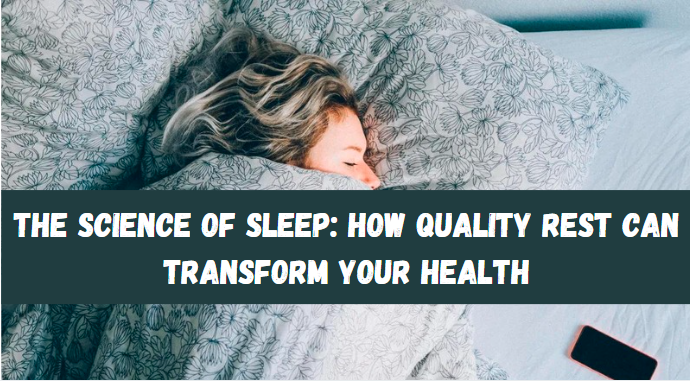Contents
Introduction
Sleep is an essential component of our daily lives, yet its importance is often overlooked. Quality sleep is crucial for physical health, mental well-being, and overall quality of life. This guide delves into the science of sleep, exploring how quality rest can transform your health and providing tips for improving your sleep habits.
The Science of Sleep
Understanding Sleep Cycles
Sleep is a complex biological process that involves several stages and cycles. Each night, we cycle through different stages of sleep, each serving a unique purpose.
The Stages of Sleep
- NREM Stage 1: Light sleep where you drift in and out of sleep, and can be easily awakened.
- NREM Stage 2: A deeper sleep where heart rate and body temperature drop, and eye movement stops.
- NREM Stage 3: Also known as deep sleep, this stage is crucial for physical restoration and growth.
- REM Sleep: The stage where most dreaming occurs. It is important for cognitive functions, such as memory and learning.
The Sleep Cycle
A complete sleep cycle lasts about 90 minutes and includes all four stages. Throughout the night, we go through several sleep cycles, with the proportion of REM sleep increasing as the night progresses.
The Benefits of Quality Sleep
Physical Health
Quality sleep is essential for maintaining physical health. During deep sleep, the body repairs tissues, builds bone and muscle, and strengthens the immune system.
- Immune Function: Adequate sleep enhances the immune system’s ability to fight off infections and illnesses.
- Weight Management: Sleep influences the hormones that regulate hunger and appetite, helping maintain a healthy weight.
- Heart Health: Quality sleep reduces the risk of heart disease by lowering blood pressure and inflammation.
Mental Health
Sleep has a profound impact on mental health and emotional well-being. REM sleep, in particular, is important for cognitive functions.
- Mood Regulation: Sleep helps regulate emotions and reduces the risk of mood disorders, such as depression and anxiety.
- Cognitive Function: Adequate sleep improves memory, concentration, and problem-solving skills.
- Stress Reduction: Quality sleep helps manage stress levels by reducing the production of stress hormones.
Long-Term Health Benefits
Chronic sleep deprivation can lead to serious long-term health issues, including an increased risk of chronic conditions such as diabetes, cardiovascular disease, and neurodegenerative disorders.
Factors Affecting Sleep Quality
Sleep Environment
Creating a conducive sleep environment is essential for quality rest.
- Comfortable Mattress and Pillows: Investing in a good mattress and pillows can significantly improve sleep quality.
- Temperature: Keep the bedroom cool, between 60-67°F (15-19°C), for optimal sleep.
- Noise and Light: Minimize noise and light exposure by using earplugs, blackout curtains, or white noise machines.
Lifestyle Choices
Certain lifestyle choices can either enhance or disrupt sleep quality.
- Diet: Avoid heavy meals, caffeine, and alcohol close to bedtime. Opt for a light, healthy snack if needed.
- Exercise: Regular physical activity promotes better sleep, but avoid vigorous exercise close to bedtime.
- Screen Time: Limit exposure to screens at least an hour before bed, as blue light can interfere with the production of melatonin, the sleep hormone.
Sleep Routine
Maintaining a consistent sleep routine helps regulate your body’s internal clock.
- Regular Sleep Schedule: Go to bed and wake up at the same time every day, even on weekends.
- Bedtime Routine: Establish a relaxing pre-sleep routine, such as reading, taking a warm bath, or practicing mindfulness.
Common Sleep Disorders
Insomnia
Insomnia is characterized by difficulty falling asleep, staying asleep, or waking up too early. It can be caused by stress, anxiety, medical conditions, or lifestyle factors.
Sleep Apnea
Sleep apnea is a serious disorder where breathing repeatedly stops and starts during sleep. It is often marked by loud snoring and daytime fatigue.
Restless Leg Syndrome (RLS)
RLS is a condition that causes an uncontrollable urge to move the legs, usually due to uncomfortable sensations. It can interfere with falling and staying asleep.
Narcolepsy
Narcolepsy is a neurological disorder that affects the control of sleep and wakefulness, leading to excessive daytime sleepiness and sudden sleep attacks.
Tips for Improving Sleep Quality
Create a Sleep-Inducing Environment
- Dark and Quiet: Use blackout curtains and earplugs to create a dark and quiet sleep environment.
- Comfortable Bedding: Invest in a comfortable mattress and pillows that support your sleep position.
- Cool Temperature: Keep your bedroom cool and well-ventilated.
Develop Healthy Sleep Habits
- Consistent Sleep Schedule: Stick to a regular sleep schedule, even on weekends.
- Relaxing Bedtime Routine: Engage in calming activities before bed, such as reading or taking a warm bath.
- Limit Naps: Avoid long naps during the day, especially in the afternoon.
Manage Stress and Anxiety
- Mindfulness and Meditation: Practice mindfulness and meditation to reduce stress and anxiety.
- Physical Activity: Regular exercise can help reduce stress and improve sleep quality.
- Cognitive Behavioral Therapy for Insomnia (CBT-I): Seek professional help if you have chronic insomnia.
Seek Professional Help for Sleep Disorders
If you suspect you have a sleep disorder, consult a healthcare professional for diagnosis and treatment. Treatments may include lifestyle changes, medications, or specialized therapies such as CPAP for sleep apnea.
Conclusion
Quality sleep is vital for overall health and well-being. Understanding the science of sleep and adopting healthy sleep habits can significantly improve your physical and mental health. By prioritizing sleep and making necessary changes to your sleep environment and lifestyle, you can transform your health and enjoy the many benefits of restorative sleep.




